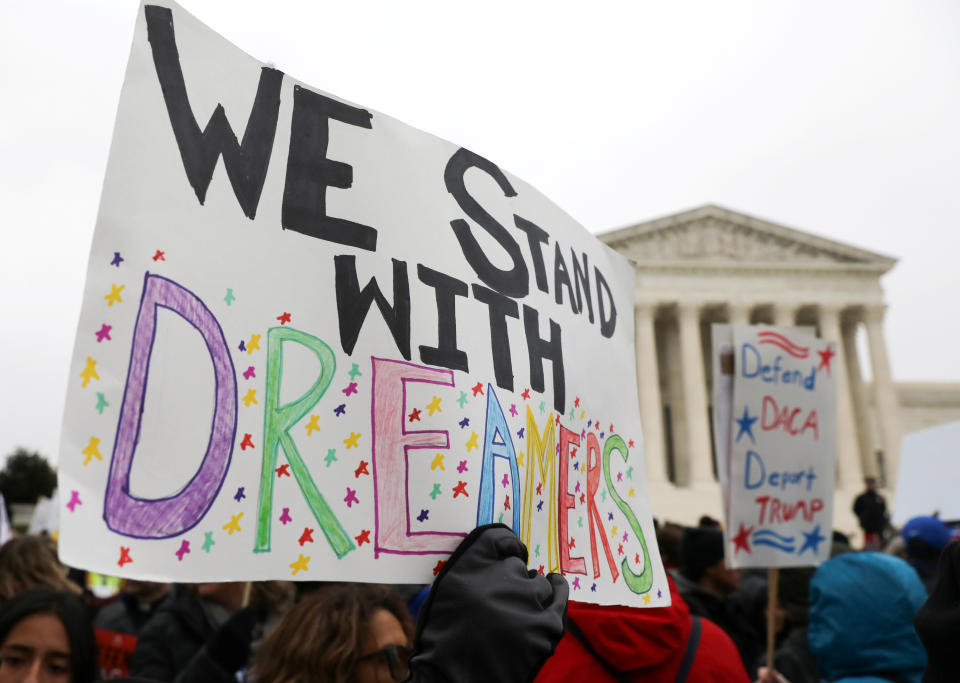As Supreme Court weighs DACA, Trump pushes fiction about 'hardened criminals'
As the Supreme Court considers whether it is legal for the Trump administration to cancel the Deferred Action for Childhood Arrivals, or DACA, program, the president and his allies have begun spinning a familiar — and false — narrative about the program’s nearly 700,000 beneficiaries.
“Many of the people in DACA, no longer very young, are far from ‘angels,’” Trump tweeted Tuesday morning, hours before the Supreme Court was scheduled to hear opening arguments in the DACA case. “Some are very tough, hardened criminals.”
The tweet is in line with Trump’s past rhetoric, which frequently employs unsubstantiated characterization of immigrants in general as criminals, and seeks to win support for unpopular actions by demonizing the people who will be affected by them. Exactly a month ago, he said the Kurds were “not angels” while defending his decision to abandon the U.S.’s key allies in Syria.

Opinion polls have shown that Americans, including Republicans, by a large majority support the DACA program, which allows noncitizens who entered the country illegally as children and meet certain criteria to remain and work in the United States, but does not afford them citizenship.
Whatever one thinks of its morality, Trump’s attempt to paint DACA recipients as criminals is wrong by definition: Anyone currently receiving DACA protections has already been heavily vetted by the U.S. government. Enrollment in the Obama-era program requires applicants to pass a criminal background check. Applicants who’ve been “convicted of a felony, significant misdemeanor, or three or more other misdemeanors,” or otherwise pose a threat to national security or public safety, are not eligible for DACA.
Nevertheless, the president and others in his administration have pushed this characterization.

On Tuesday night, acting U.S. Citizenship and Immigration Services Director Ken Cuccinelli appeared on Lou Dobbs’s Fox Business Network show, where he was asked to comment on “new reports” that 53,792 DACA recipients have arrest records.
Not long after that number was displayed, at Dobbs’s request, across the screen, it found its way into Trump’s Twitter feed.
DACA recipients with arrest records: 53,792! That is a very large proportion of the total. @LouDobbs Not good, but we will be able to make a deal with the Dems!
— Donald J. Trump (@realDonaldTrump) November 13, 2019
Cuccinelli, who has since been elevated to acting deputy Homeland Security secretary, tweeted about the 53,000-plus arrest records again on Wednesday, writing, “These numbers reveal a very different version of the DACA narrative.”
“That’s a big scary number, he says, but big scary numbers by themselves don’t tell you anything,” Alex Nowrasteh, director of immigration studies at the Cato Institute's Center for Global Liberty and Prosperity, told Yahoo News. “You have to compare it to something else. Compared to the rest of us, these DACA kids are less likely to be arrested than other people in the U.S. That should make us feel safer, not less safe.”
Although Dobbs said the “stunning” figure came from “new reports” about “so-called Dreamers,” the number actually comes from a press release issued by USCIS on June 18, 2018, which compiled data on the total number of DACA applicants (including those who were not approved) since the program’s launch in 2012.
“Of those individuals whose DACA requests were approved and had one or more arrests or apprehensions, 53,792 were arrested or apprehended prior to their most recent approval,” reads the release from USCIS.
“The USCIS report does not identify convictions, only arrests,” Nowrasteh wrote in a post on the Cato Institute website after the data was first released. “It also does not provide the comparable arrest rates for other populations, giving the false impression that that is a high number of arrests for such a small population.”

To put things in perspective, Nowrasteh did his own calculations using the USCIS data and annual nationwide arrest numbers from the Bureau of Justice Statistics to find that “the annual arrest rate of those who applied for DACA is 86 percent below the annual arrest rate for the non-DACA resident population.”
“This is a safer population and a less criminal population,” Nowrasteh said of DACA applicants. He said that was “partly due to the design of the program and partly because immigrants are just less likely to be criminals” than native-born Americans.
According to the same USCIS report, of the total 888,765 people who applied for DACA between 2012 and 2018, 797,297 of them, or 89.7 percent, had no arrests or apprehensions on their record. Of those, 710,842 were ultimately approved.
Peter Boogaard, communications director for FWD.us, a political advocacy group that supports immigration reform, said he sees these latest attempts to paint DACA recipients as criminals as evidence of the Trump administration’s concern about potential political backlash if the Supreme Court, which heard arguments on Tuesday in a case challenging the administration’s efforts to end DACA, rules against the program. Polls show that an overwhelming majority of Americans support allowing Dreamers to stay in the country.
“This is a pretty naked attempt to try to undermine and attack an overwhelmingly popular and overwhelmingly successful group of people,” Boogaard told Yahoo News. “We’re talking about DACA recipients who are parents to nearly 256,000 U.S. citizen children … who’ve been here on average [for] 20 years, [who are] nurses, teachers, doctors. They’re part of the fabric of our country.”
Boogaard pointed out that the Trump administration’s attempts to end DACA have been blocked by the federal courts until now. Officials have been required to renew protections for existing beneficiaries for the last three years, so if “tough, hardened criminals” are among them, it’s the administration’s own fault.
“Every single person who currently has DACA was [approved] under the Trump administration,” Boogaard said.
_____
Download the Yahoo News app to customize your experience.
Read more from Yahoo News:



